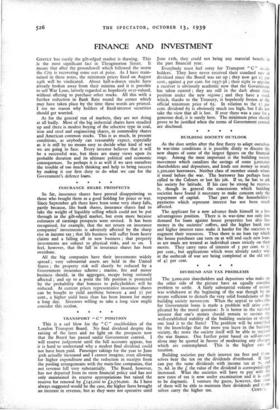DIVIDEND AND TAX PROBLEMS
The 3,000,000 shareholders and depositors who make up the other side of the picture have an equally complex problem to settle. A fairly substantial volume of money was withdrawn at the beginning of the war though by no means sufficient to disturb the very solid foundations of the building society movement. When the appeal to subscribe for Government loans is made a problem will arise com- plicated by the moral question: Is it better in the national interest that one's money should remain to sustain the well-established stability of the building societies or should one lend it to the State? The problem will be simplified by the knowledge that the more you leave in the building society, the more the society itself will be able to support the war finance. One further point based on self-interest alone may be quoted in favour of moderating any change which are contemplated. This is the higher late of taxation.
Building societies pay their interest tax free and them- selves bear the tax on the dividends distributed. If they can pay the same dividends with income tax at 7s. and 7s. 6d. in the the value of the dividend is correspondinglY increased. What the societies will have to pay with the new rates of tax is now under examination and it is early to be dogmatic. I venture the guess, however, that mon of them will be able to maintain their dividends and them- selves carry the higher tax.
CIISTCS.










































 Previous page
Previous page